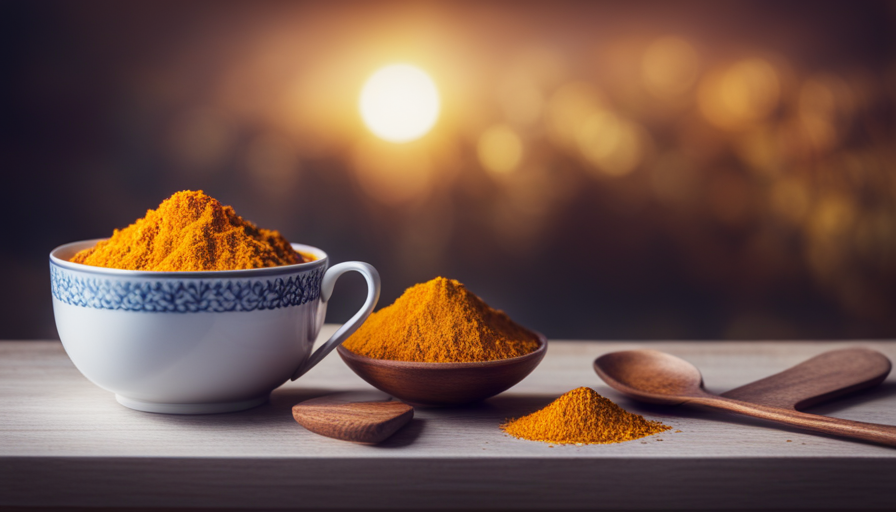As a person who is constantly seeking natural methods to enhance my health, I was fascinated when I initially learned about the advantages of consuming turmeric. This bright yellow spice has a history of being utilized for centuries in both traditional medicine and cooking, and has now caught the attention of the wellness community for its ability to potentially decrease inflammation, enhance immunity, and even enhance cognitive function.
But is drinking turmeric really as good for you as some claim? In this article, we’ll explore the science behind turmeric’s health benefits, as well as any potential risks or side effects to be aware of.
Whether you’re a fan of spicy foods or not, turmeric is a fascinating spice to learn about. From its bright color to its potential health benefits, there’s no denying that it’s a unique addition to any diet. But before we dive into the specifics, it’s important to note that while turmeric may have some promising health benefits, it’s not a miracle cure for any specific condition. As with any supplement or health trend, it’s important to approach it with a critical eye and do your own research.
That being said, let’s take a look at what the science says about drinking turmeric and its potential impact on our health.
Key Takeaways
- Turmeric has anti-inflammatory and antioxidant properties that can help reduce the risk of chronic diseases.
- Turmeric may have a positive effect on mental health, improving symptoms of depression and anxiety in some individuals.
- Turmeric is generally safe for most people when consumed in moderation, but high doses may lead to serious gastrointestinal problems and may interact with certain medications.
- More research is needed to confirm the effectiveness of turmeric in humans and to determine its potential health benefits for a wider range of people.
The Health Benefits of Turmeric
You’ll be pleased to know that incorporating turmeric into your diet can provide you with a multitude of health benefits. Turmeric, a spice commonly used in Indian cuisine, has been found to have anti-inflammatory and antioxidant properties. These properties can help reduce the risk of chronic diseases such as heart disease, diabetes, and cancer.
Studies have shown that turmeric may also have a positive effect on mental health. The spice has been found to increase levels of brain-derived neurotrophic factor (BDNF), a protein that plays a role in brain function and mood regulation. Additionally, turmeric has been found to improve symptoms of depression and anxiety in some individuals.
With all these health benefits, it’s no wonder why turmeric has become a popular ingredient in many dishes.
To learn more about how to incorporate turmeric into your diet, keep reading.
How to Incorporate Turmeric into Your Diet
Adding turmeric to your meals might seem intimidating, but it’s actually a simple way to boost your health and add flavor to your food. Here are some easy ways to incorporate turmeric into your diet:
-
Make a turmeric latte: This is a popular way to consume turmeric, especially for those who don’t enjoy the taste of traditional turmeric dishes. Simply mix turmeric powder with milk, honey, and other spices like cinnamon and ginger for a delicious and nutritious drink.
-
Use turmeric in your cooking: Turmeric can be added to many different dishes, including soups, stews, stir-fries, and even scrambled eggs. It adds a warm, earthy flavor and a vibrant yellow color to your food.
-
Try turmeric smoothie recipes: You can blend turmeric powder with fruits and vegetables for a nutrient-packed smoothie. Some popular ingredients to pair with turmeric include mango, pineapple, ginger, and spinach.
Incorporating turmeric into your diet can have many health benefits, but it’s important to also be aware of potential risks and side effects.
Potential Risks and Side Effects
Before incorporating turmeric into your diet, it’s crucial to be aware of the potential risks and side effects that may arise. While turmeric is generally safe for most people when consumed in moderation, some individuals may experience gastrointestinal issues such as nausea, diarrhea, and stomach upset. In rare cases, high doses of turmeric may lead to more serious gastrointestinal problems such as ulcers and bleeding.
Turmeric may also interact with certain medications, particularly those that affect blood clotting or the liver. It’s important to consult with a healthcare provider before taking turmeric if you’re on any medications or have a history of blood clotting disorders or liver disease.
Being aware of these potential risks and side effects can help you make an informed decision about whether or not to incorporate turmeric into your diet. In the next section, we’ll discuss what the science says about the potential health benefits of turmeric.
What the Science Says
As I delve into the science behind drinking turmeric, two key points stand out: the studies on turmeric’s health benefits and the limitations of current research.
While there have been numerous studies on the potential benefits of turmeric, such as reducing inflammation and improving brain function, it’s important to acknowledge that many of these studies have been conducted on animals or in test tubes.
Additionally, the current research on turmeric’s health benefits is limited and more studies are needed to confirm its effectiveness in humans.
Studies on Turmeric’s Health Benefits
You may have heard that ‘an apple a day keeps the doctor away,’ but did you know that studies have shown turmeric’s health benefits, including its anti-inflammatory and antioxidant properties? Turmeric, a spice commonly used in Indian and Middle Eastern cuisine, has been found to have a number of potential health benefits when consumed regularly. In fact, some studies have even suggested that taking turmeric supplements could improve brain function.
To further emphasize the potential benefits of turmeric, here is a table outlining some of the key findings from recent studies:
| Study | Findings |
|---|---|
| A study published in the Journal of Nutrition | Turmeric supplementation improved working memory and attention span in healthy adults |
| A study published in the American Journal of Cardiology | Turmeric reduced inflammation and oxidative stress in patients with acute coronary syndrome |
| A study published in the Journal of Alternative and Complementary Medicine | Turmeric reduced inflammation in patients with osteoarthritis |
While these findings are promising, it is important to note that the research on turmeric’s health benefits is still in its early stages. In the next section, we will explore the limitations of current research on this topic.
Limitations of Current Research
However, there are limitations to the current research on the potential health benefits of turmeric. One limitation is the study design used in most research. Many studies use animal models or test-tube experiments, which may not accurately reflect how turmeric affects the human body.
Additionally, many studies have not been conducted for long enough periods of time to fully understand the long-term effects of turmeric consumption. Another limitation is the sample size of the studies. Many studies have been conducted on small groups of people, which may not be representative of the general population.
This makes it difficult to draw conclusions about the overall health benefits of turmeric. More research is needed with larger sample sizes to determine the potential health benefits of turmeric for a wider range of people. Despite these limitations, many studies have shown promising results and suggest that turmeric may have potential health benefits.
Frequently Asked Questions
Can drinking turmeric cure all health issues?
Drinking turmeric is not a cure-all for health issues. Turmeric hype may be due to the placebo effect. While turmeric has some potential health benefits, it should not replace medical treatment.
Is it safe to consume turmeric in large quantities?
Turmeric is a powerful spice with many health benefits. However, consuming too much can lead to turmeric overdose and potentially cause liver damage. It’s important to consume in moderation and consult with a medical professional if concerned.
Can turmeric be used as a replacement for medication?
While turmeric has many health benefits, it cannot replace medication. It may be used as a complementary therapy, but should not be relied on solely. Always consult with a healthcare professional before making any changes to medication or treatment plans.
Can turmeric be harmful to certain individuals?
As someone who enjoys sipping on turmeric lattes, it’s important to note that turmeric allergies do exist and potential side effects such as nausea and diarrhea have been reported. It’s always best to consult with a healthcare professional before incorporating any new supplement into your diet.
Does turmeric have any impact on mental health?
Turmeric has been found to have mental benefits, including improved cognitive function. Curcumin, the active ingredient, has been shown to increase brain-derived neurotrophic factor, which is associated with better brain function and a lower risk of mental disorders.
Conclusion
Well, folks, it looks like the verdict is in: drinking turmeric is the ultimate cure-all! According to all those Instagram influencers and wellness gurus, turmeric can do everything from curing cancer to giving you eternal youth.
So why not jump on the bandwagon and start guzzling that golden milk every day? But hold your horses, my friends. While there may be some small benefits to consuming turmeric, the hype surrounding it is largely exaggerated.
Sure, it contains antioxidants and anti-inflammatory compounds, but so do many other foods that are less trendy and more affordable. And let’s not forget that turmeric can have some pretty nasty side effects, like upset stomach and diarrhea.
So before you go chugging down that turmeric latte, maybe do a little more research and consider whether it’s actually worth it.










